Iraqi Referendum: Photographing 15 October 2005
[
index]
[24,037 page views]
The preparations for the Iraqi Referendum's polling site security began more than a month ago. Staff officers from military units across the theater conferred over the various possibilities and scenarios as they developed a plan to ensure the local populace a safe referendum vote. Noncommissioned officers flexed these concepts against the assets at hand to provide a reality check on what was feasible and a pipe dream. Officers and soldiers alike down at the platoon level created plans on how best to utilize their contacts in sector to execute the security plan. Ideas were tossed around as each played the role of the enemy, figuring out the weaknesses of the master concept. A vehicle borne improvised explosive device (VBIED), or car bomb, rushes the outer cordon, runs through the Iraqi Police and detonates where the crowds have gathered. A suicide bomber patiently mingles with the crowd before exploding himself in a flurry of fire and ball bearings to cause confusion and panic. Mortars will fall from locations surrounding the polling site. No stones were left unturned as the plan was fleshed out from every conceivable angle.
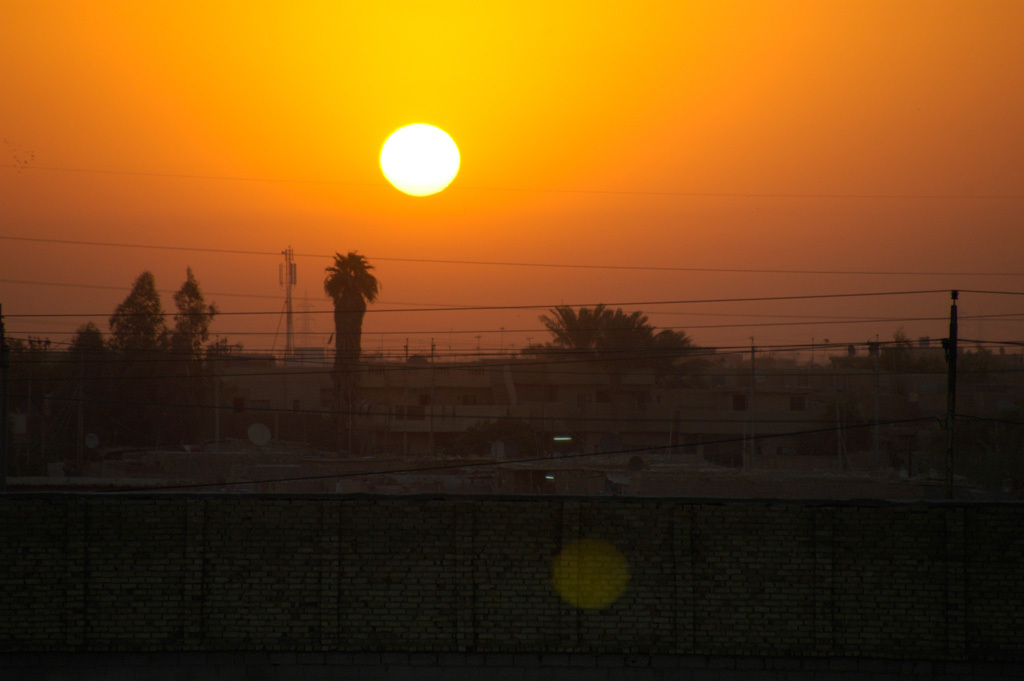 |
| As the morning of the Referendum vote breaks, American patrols prepare to face an unpredictable enemy that grows increasingly lethal with each passing day. | |
With a basic plan in place to protect the Iraqi citizens, battalions across theater began tasking their assets to begin securing the region. Engineer companies constructed obstacles to block ingress routes that bypassed major roads. Logistics companies hauled barriers and established rings of protective concrete around polling sites. Psychological operatives interviewed locals to get a feel for sentiments of safeties and attempt to identify insurgent cells. The information campaign passed out flyers, posted banners and ran advertising spots to impress upon the people the significance of the referendum vote. Commanders met with local leadership to ensure emphasis was being pressed upon citizens to exercise their voting right. Liaison teams coordinated with Iraqi Police, Iraqi Security Force, Public Order Brigade and Iraqi Commandos to synchronize the defensive plans between coalition and host nation. Combat companies embarked on a massive campaign to locate and capture as many known targets as possible. Internment facilities were bulging at the sides yet there were always more insurgent cells that continued to lurk in the shadows.
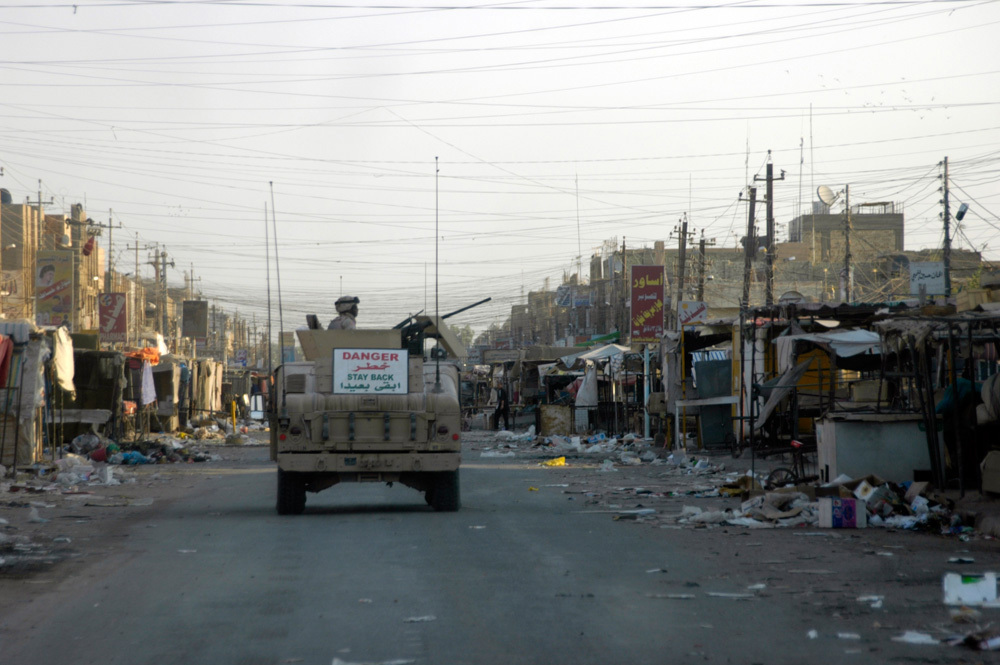 |
| Normally, the market streets are bustling with people even before daybreak. Today, October 15th, the streets are ominously quiet. | |
As the hour of the vote drew nigh, it seemed there was always another task left to accomplish. Soldiers pushed themselves against the clock to finalize the plan. Yet it always seemed as if a new technique exhibited by the insurgency could thwart the entire effort to secure the referendum vote. Attacks against coalition forces and Iraqi nationals increased, ranging from multiple mortar launches against American bases and VBIEDs aimed at congregations of Iraqi citizens. Furthermore, disagreement within the provisional Iraqi government itself seemed to threaten the very possibility of executing the referendum on schedule. As political players made concessions and changes, the consensus swung back in favor of the vote. Almost simultaneously, the final security plan seemed to emerge from the chaos. It was very simple at its heart. Surrounding each polling site are concrete barriers, inhibiting any VBIEDs from reaching the site. Additionally, the barriers provide protection from flying debris in the event of a rocket or mortar impact. The Iraqis themselves would provide the visible security at the inner and outer cordons. As such, Iraqis would conduct searches of voters and inspect the registration cards. Aside from international inspectors from the United Nations, there was to be next to zero international presence inside the polling sites. American forces were to remain on the outskirts, providing security against insurgents before they had a chance to launch mortars, employ snipers or utilize a VBIED. By 11:00 pm on the night prior, a complete traffic ban went into effect to further provide security against VBIED attempts, the movement of rebel militias and the smuggling of weapons.
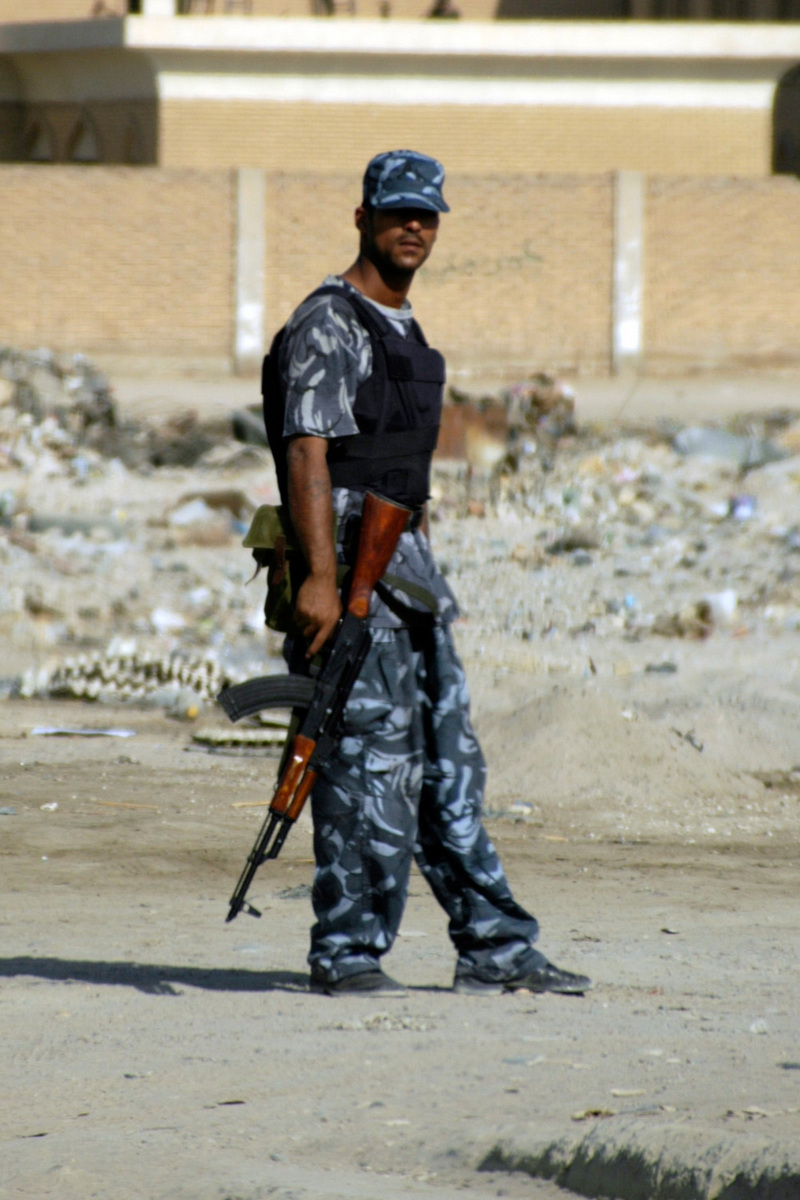 |
| To avoid the stigma of international accusations regarding an American influenced vote, it was imperative to have the Iraqis provide the on site security at their polling centers. | |
Nobody knew what to expect on the day of the referendum vote. Despite repeated analysis of the election from January 2005, Iraq posed too dynamic a variable set for analysis to paint a clear, definable picture. As the sun rose over Baghdad on the 15th, it was anyone's guess as to how the next twelve hours would pan out. Before embarking on a morning patrol, I stopped in with the TOC (tactical operations center) to get a situation report. The battle captain essentially shrugged his shoulders, briefing that all was quiet in sector with no contact made during the night. This morning I was riding with the Battalion S3 and his security detail, a patrol that would span the entire area of responsibility to get a feel for overall operations and be able to provide additional forces on the ground in an emergency situation.
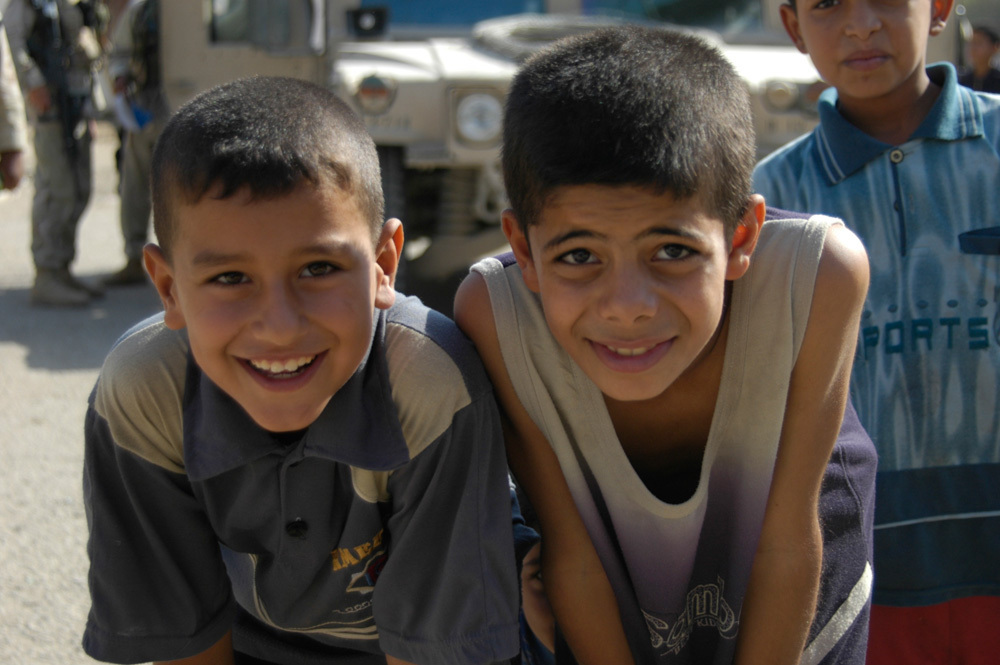 |
| It seems that no matter how bad conditions can be, children have an indomitable spirit to find happiness and friendship. The future of Iraq lies in their hands. | |
It began like any other patrol, a briefing of the situation as best we knew it. Each vehicle received a final pre-combat inspection for functionality. Radios were checked for connectivity to the operations center. With everything in place, we strapped on our body armor, mounted the HMMWVs (high mobility, multi-wheeled vehicles AKA "Humvee" and rolled outside the protective walls of the FOB (forward operations base). It was 6:00 am and the sun, just a hazy ball of red peaking over the horizon out east, began casting its first rays of light onto Baghdad. Rolling onto Route Irish gave everyone an odd chill down their spine. It was just empty and devoid of activity - like a suspense movie when suddenly things get too quiet. Route Irish is normally bustling with traffic, donkey carts and pedestrians even before the curfew has lifted. But today, the day of the referendum, was different. There was not a soul to be seen in any direction besides the occasional American patrol passing in the opposite direction.
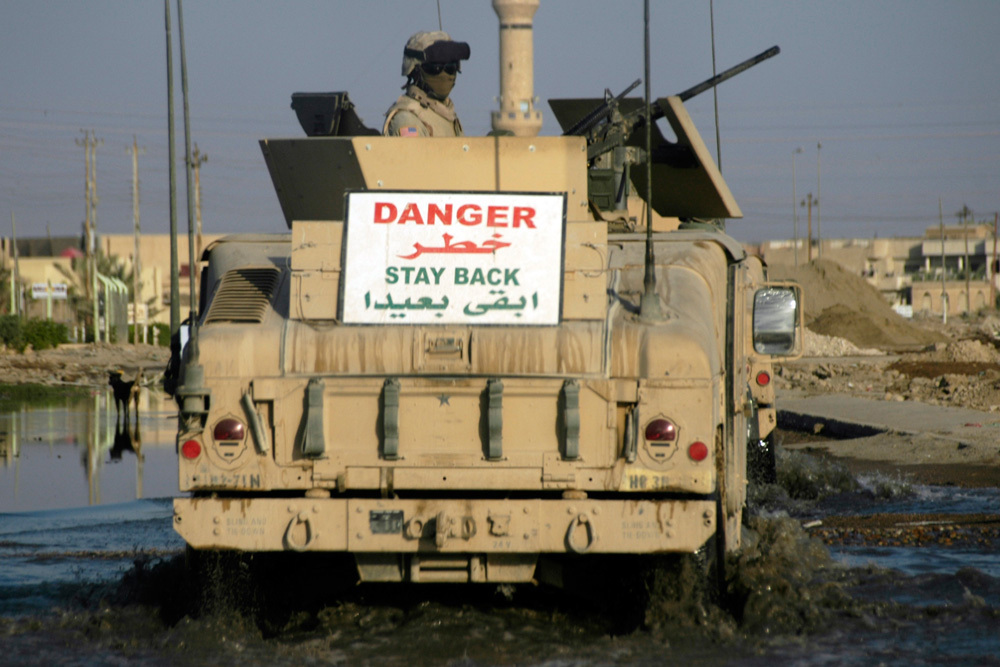 |
| Despite the ongoing problems with the roads in the more remote parts of Baghdad, the American patrol slogs its way through raw sewage to bring as much security to all Iraqis. | |
With still an hour to go before the actual polls opened, we anticipated seeing movement of people on foot. Stories from ten months prior told of pedestrians streaming towards election centers with a determination. We opted to take the patrol into the rural portions of the sector, figuring more people would be on the move from the outer vicinity towards the city's core. Still, virtually zero activity. Occasionally, a man would step from a crumbled hut and with hands on hips, just watch our patrol drive past. Had the informational campaigns failed? Were the people aware of the vote? Or perhaps had the insurgent propaganda machine scared the locals from voting in the referendum?
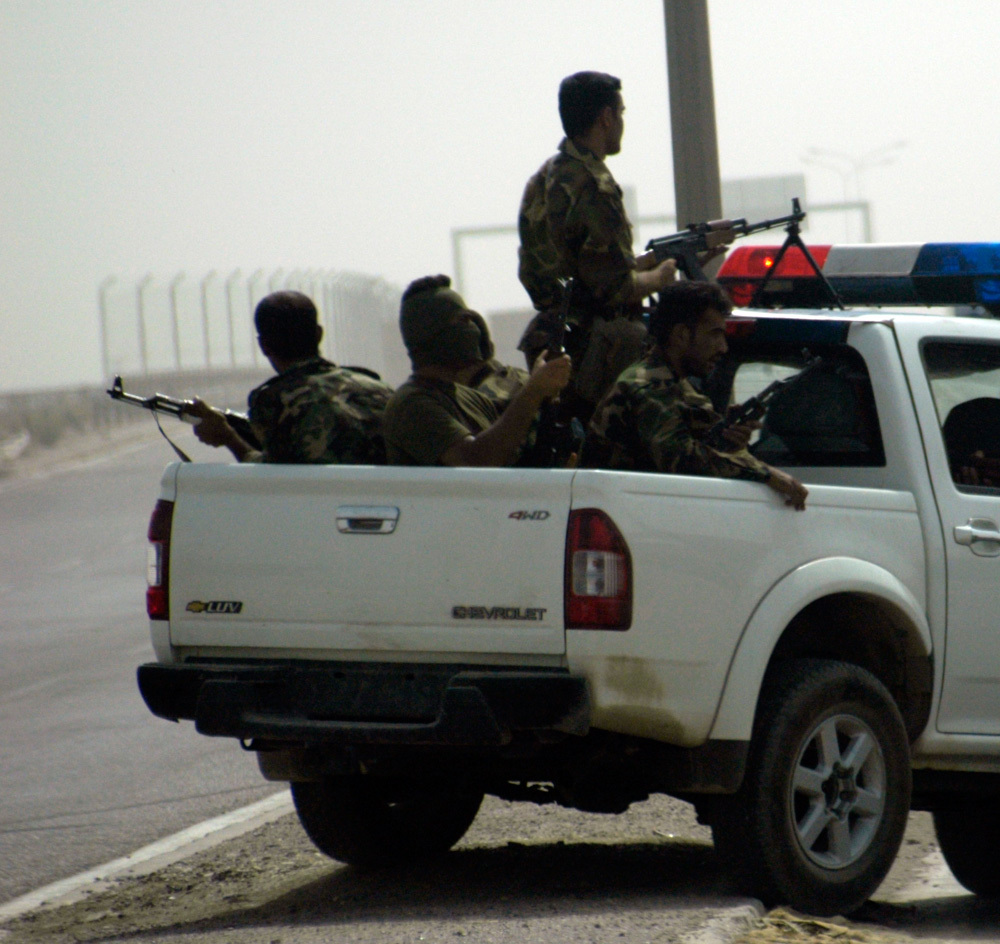 |
| Iraqi Police do not mess around when they roll through Baghdad. Reminiscent of a posse from the wild west, they ride armed to the hilt prepared to handle a variety of threats. | |
We continued throughout the battalion sector, moving into more populated areas. By now, the sun was well into the sky and the polls had been open for almost an hour. Still, many streets remained devoid of people altogether. Slowly, as we pushed northward, things began to change. Passing by polling sites showed that people were trickling into the centers in small packs. Iraqi Police inspected them for contraband and voter registration before letting them inside. On a normal day, vehicular traffic congests roadways all throughout the sector. But even without cars, Baghdad is predominantly a pedestrian city with a strong contingent of vendors, sheep herders, storefront businesses, open markets and general foot traffic. The small pockets of citizens hardly represented a fraction of the normal thoroughfare known to thrive in the city.
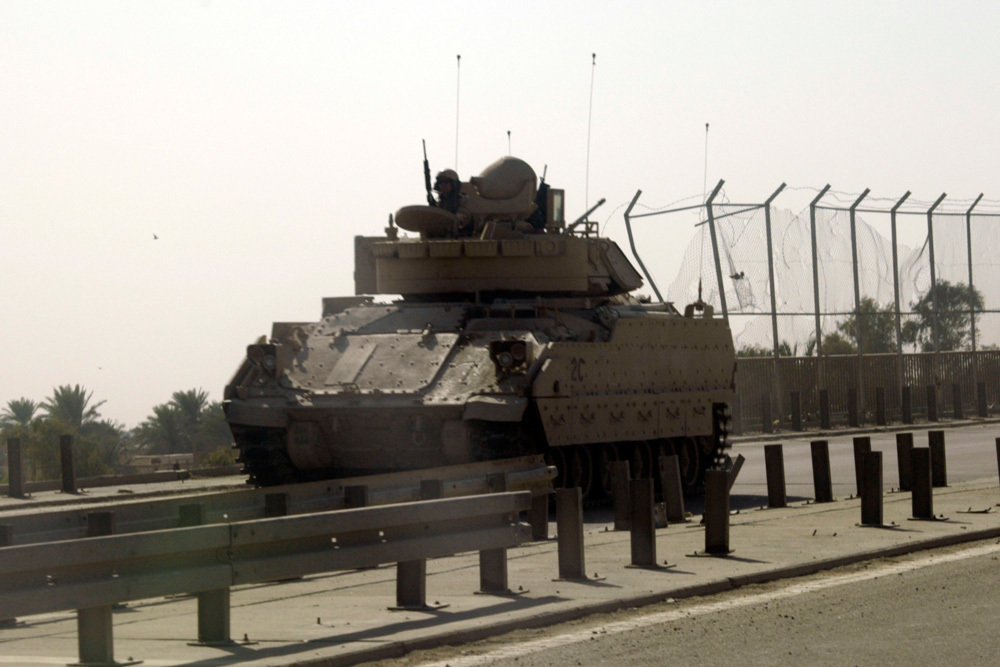 |
| Sometimes the simple "Show of Force" technique is required to keep would be insurgents from causing trouble. | |
Everything changed into a surreal state within the next hour. The best way to describe what we saw is to imagine a "Snow Day" in America with closed schools. Picture children playing in the street making forts, snowmen and generally running amok. Now melt the snow and replace it with soccer balls. While adults still remained largely indoors, children like we had never seen before surged outdoors and began to play in the empty streets. By the thousands, games of pick-up soccer ensued utilizing rocks and sandals for goal posts. Children of all ages filled the streets enjoying the opportunity to play. I describe the scene as surreal, for not more than twenty-four hours prior these were the same streets we patrolled under constant threat of VBIED, small arms fire, RPG (Rocket-Propelled Grenade) attack or the new EFP (Explosively Formed Projectile). Where just yesterday we patrolled the somber world of Baghdad wrapped in the burdens of adulthood, today we witnessed a Baghdad of carefree youth. The kids were genuinely happy as if not a thing in the world stood between them and a bright future. As the patrol passed by, they would pause their games, line the road and wave to us while cheering exuberantly.
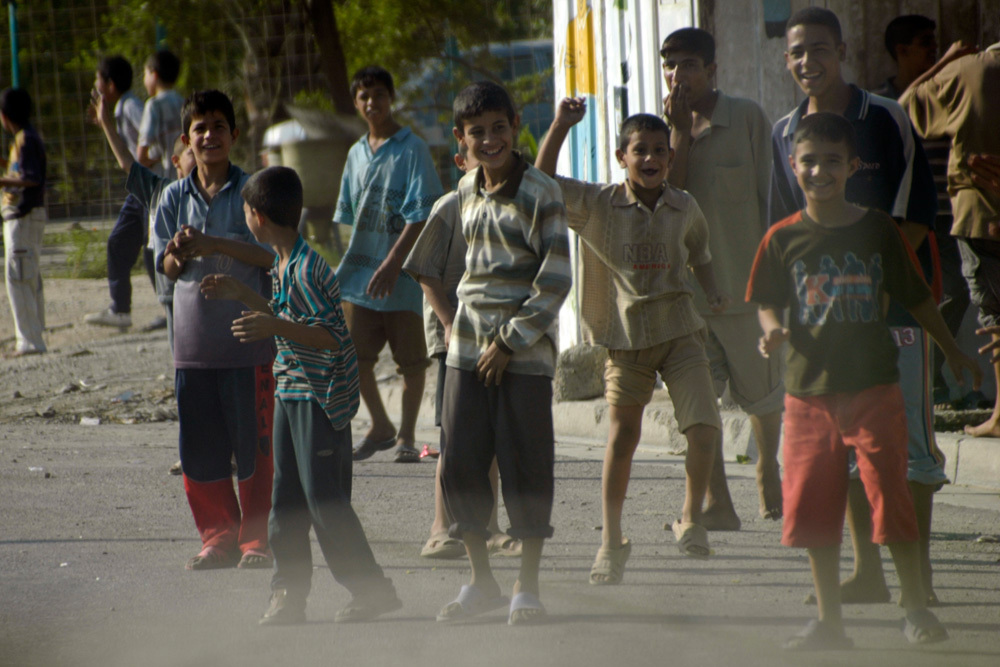 |
| As the coalition patrols would pass through, the hasty soccer games would disperse to the sidewalks whereupon the children began to wave and cheer. | |
Occasionally the patrol would stop and we would dismount to make a closer inspection of some suspicious objects or activity. We stopped approximately five cars violating the no vehicular movement policy to question the driver, inspect the vehicle and send them to the nearest parking lot. Despite the random traffic violation, the sector remained unusually quiet, especially considering the political factors at stake. Our interpreter interviewed the few adults we came in contact with to query them on their feelings for the day. Careful not to word anything such that it may construed as influencing a vote, the interpreters tried to figure out what was holding the voters back. It turns out they were taking the morning to test the waters regarding security and would head to the referendum polling sites that afternoon if all seemed safe. Inadvertently, I believe the soccer playing, throngs of children may have provided the greatest indirect security to the sector. While insurgents have no qualms with killing kids, they cannot operate clandestinely without the kids observing the action. Thus, with the streets filled with soccer games, it became next to impossible for covert IEDs to be placed or mortar systems to be utilized without being seen.
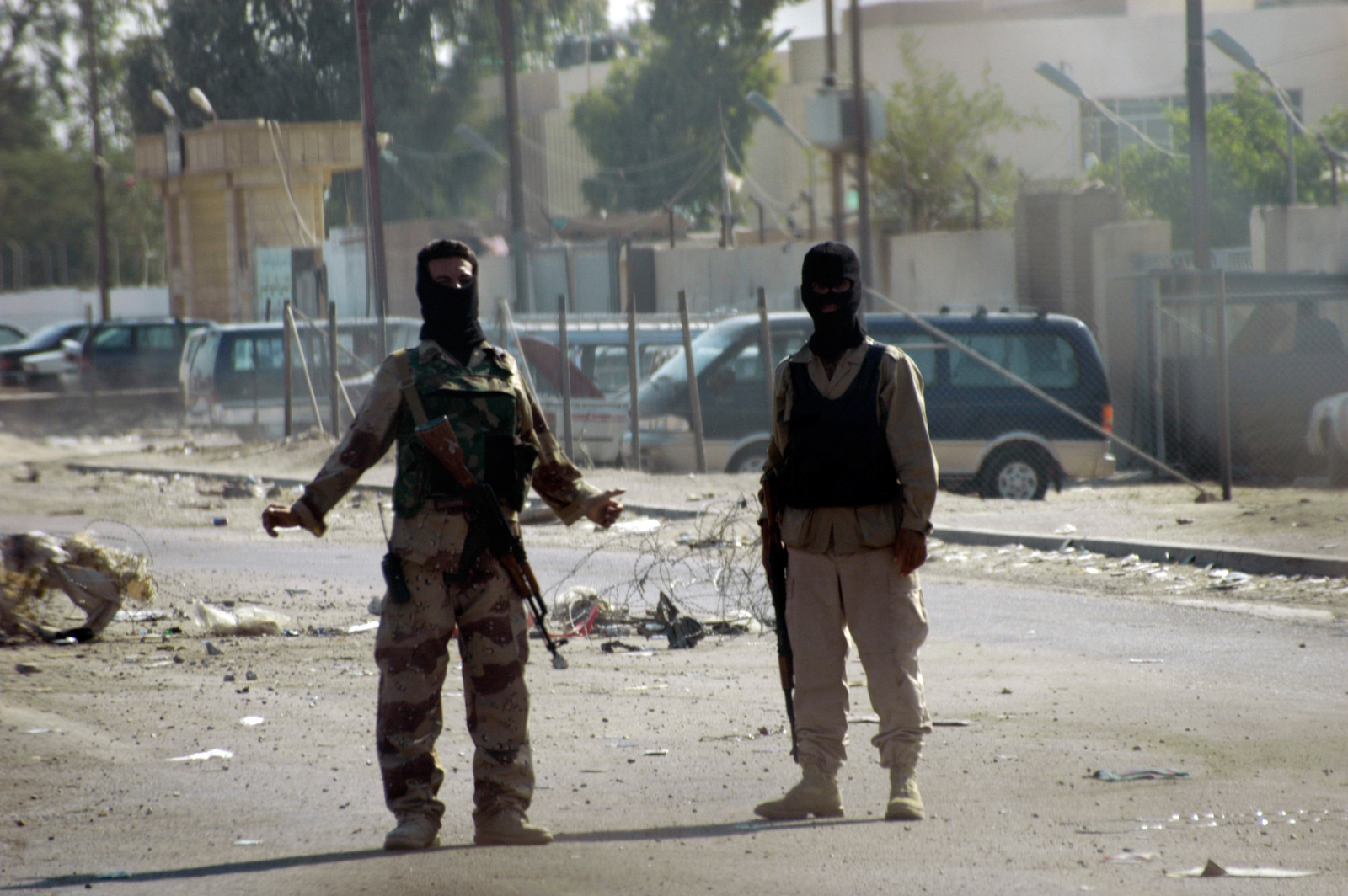 |
| The Iraqi Security Force provides interior security to Baghdad and will soon supplant the Coalition Force presence when their numbers and proficiency are adequate to secure the city. | |
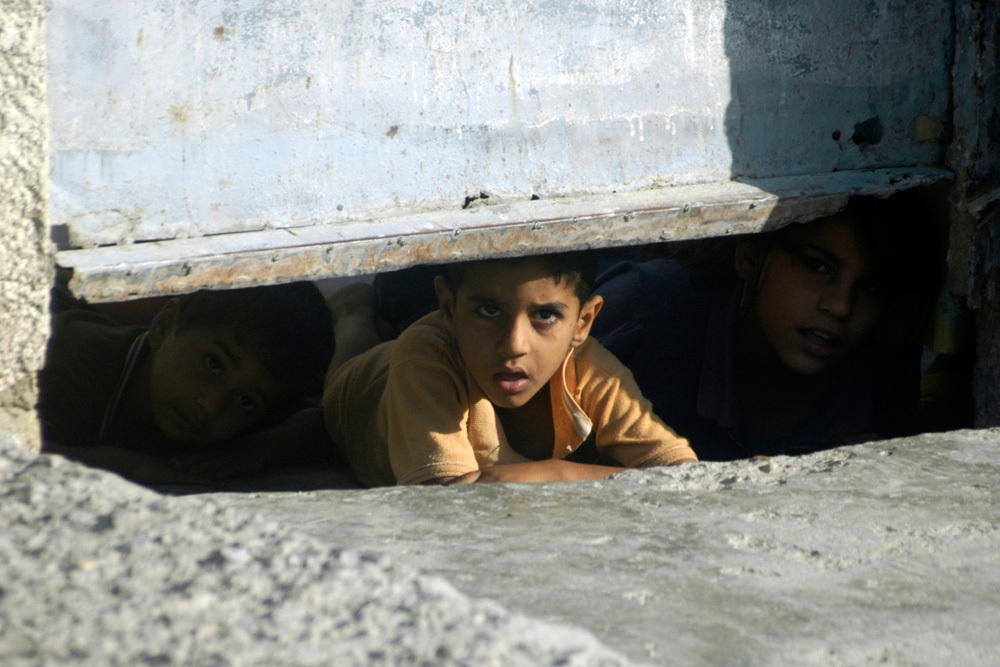 |
| Despite his mother taking him off the streets as our patrol cruised by, this young lad could not resist a peek at the American security forces. | |
After six hours, our patrol returned to the FOB hot, tired, puzzled but safe. Checking in with the operations center revealed that our observations in sector were not isolated events. Entire regions of the country were reporting similar behaviors in children's games, cautious adult voters and general serenity across Baghdad. Although puzzling, it was a satisfying outcome for the referendum, at least as far as security planning is concerned. As the hours passed through the afternoon, the sector remained inactive in contrast to the predicted mass casualty attacks. As the District Election Offices begin to count the votes, we must await the results of the Iraqi Referendum. Already the media is beginning to speculate on various outcomes. USA Today is carrying a story of general praise, including accounts of regions that were able to participate in the vote after being liberated from insurgent control as a result of fierce fighting these past months. On the flip side, Al Jazeera carries news of a Bush Administration plot to divide Iraq, instigate civil war and withdraw in the midst to leave the Sunnis powerless and surrounded by Kurdish and Shiite states.2 Only time will tell the future of Iraq, but I still believe the positive outlook held by the children playing on the street today represents the future for this Middle Eastern nation.
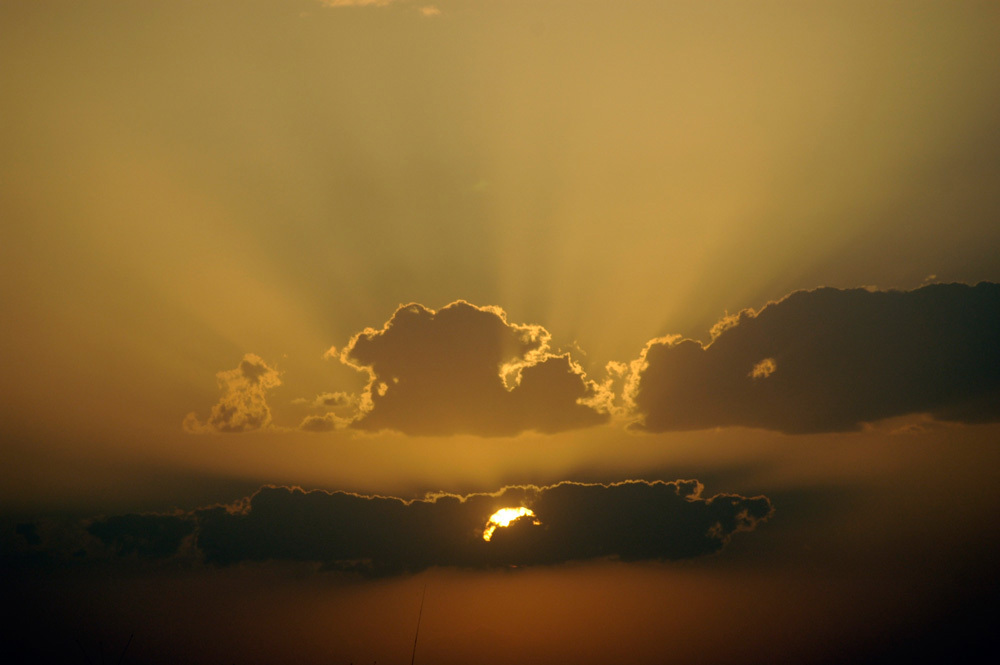 |
| In Baghad, the weeks of preparation have paid off as polling sites were able to operate throughout the day without interference from the insurgency and especially without the dark cast of violence. As the sun sets over the nation, a new era presents itself to the people. | |
- Komarow, Steven, Iraqi Voters Wait for Results, USA Today, 15 October 2005, accessed 15 October 2005 at http://www.usatoday.com/news/world/iraq/2005-10-15-iraq-referendum_x.htm
- Best Bet - Dividing Iraq, Al Jazeera, 15 October 2005, accessed 15 October 2005 at http://www.aljazeera.com/cgi-bin/news_service/middle_east_full_story.asp?service_id=9632


